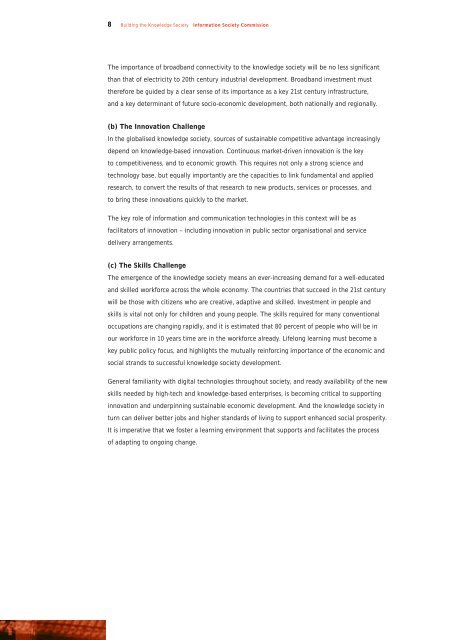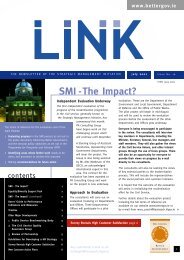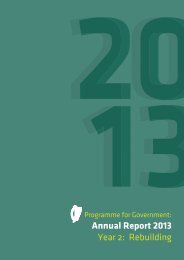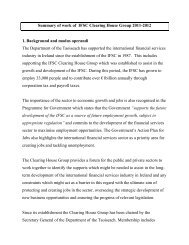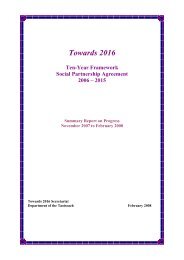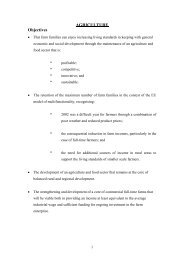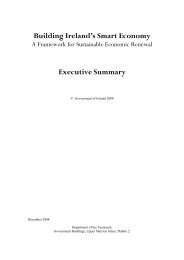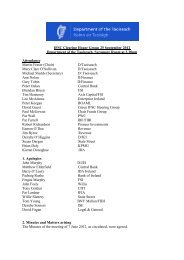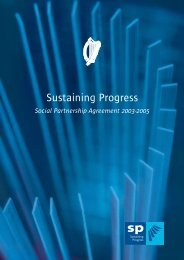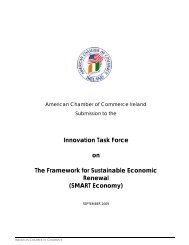Building the Knowledge Society - Department of Communications ...
Building the Knowledge Society - Department of Communications ...
Building the Knowledge Society - Department of Communications ...
You also want an ePaper? Increase the reach of your titles
YUMPU automatically turns print PDFs into web optimized ePapers that Google loves.
8 <strong>Building</strong> <strong>the</strong> <strong>Knowledge</strong> <strong>Society</strong> Information <strong>Society</strong> CommissionThe importance <strong>of</strong> broadband connectivity to <strong>the</strong> knowledge society will be no less significantthan that <strong>of</strong> electricity to 20th century industrial development. Broadband investment must<strong>the</strong>refore be guided by a clear sense <strong>of</strong> its importance as a key 21st century infrastructure,and a key determinant <strong>of</strong> future socio-economic development, both nationally and regionally.(b) The Innovation ChallengeIn <strong>the</strong> globalised knowledge society, sources <strong>of</strong> sustainable competitive advantage increasinglydepend on knowledge-based innovation. Continuous market-driven innovation is <strong>the</strong> keyto competitiveness, and to economic growth. This requires not only a strong science andtechnology base, but equally importantly are <strong>the</strong> capacities to link fundamental and appliedresearch, to convert <strong>the</strong> results <strong>of</strong> that research to new products, services or processes, andto bring <strong>the</strong>se innovations quickly to <strong>the</strong> market.The key role <strong>of</strong> information and communication technologies in this context will be asfacilitators <strong>of</strong> innovation – including innovation in public sector organisational and servicedelivery arrangements.(c) The Skills ChallengeThe emergence <strong>of</strong> <strong>the</strong> knowledge society means an ever-increasing demand for a well-educatedand skilled workforce across <strong>the</strong> whole economy. The countries that succeed in <strong>the</strong> 21st centurywill be those with citizens who are creative, adaptive and skilled. Investment in people andskills is vital not only for children and young people. The skills required for many conventionaloccupations are changing rapidly, and it is estimated that 80 percent <strong>of</strong> people who will be inour workforce in 10 years time are in <strong>the</strong> workforce already. Lifelong learning must become akey public policy focus, and highlights <strong>the</strong> mutually reinforcing importance <strong>of</strong> <strong>the</strong> economic andsocial strands to successful knowledge society development.General familiarity with digital technologies throughout society, and ready availability <strong>of</strong> <strong>the</strong> newskills needed by high-tech and knowledge-based enterprises, is becoming critical to supportinginnovation and underpinning sustainable economic development. And <strong>the</strong> knowledge society inturn can deliver better jobs and higher standards <strong>of</strong> living to support enhanced social prosperity.It is imperative that we foster a learning environment that supports and facilitates <strong>the</strong> process<strong>of</strong> adapting to ongoing change.


